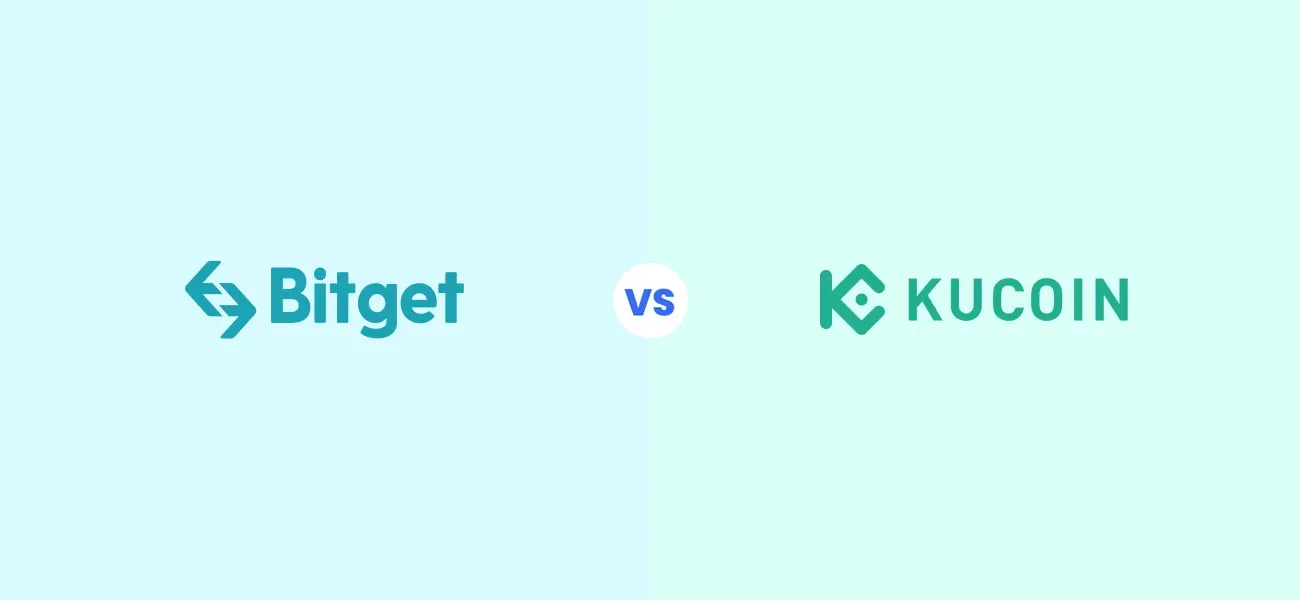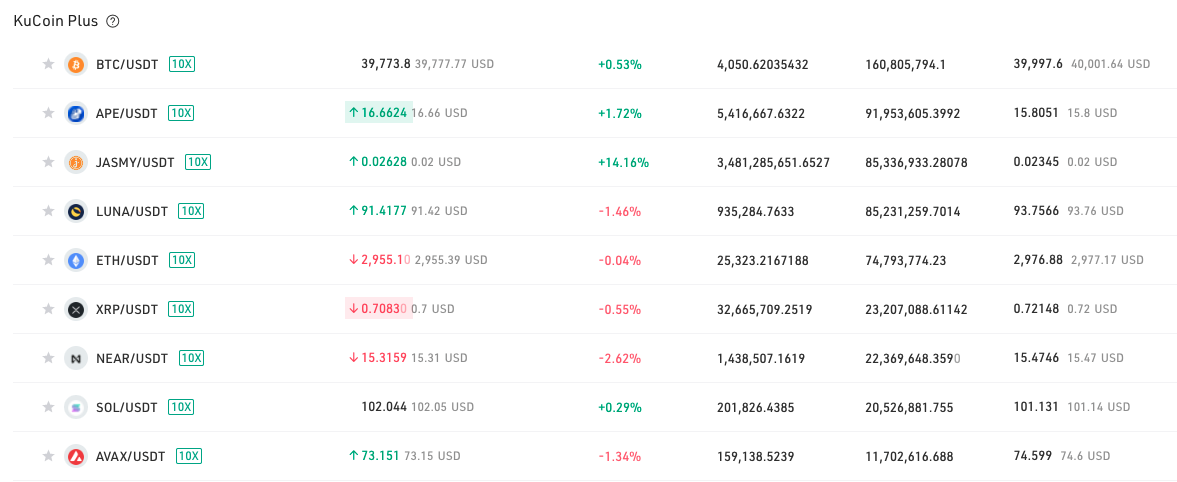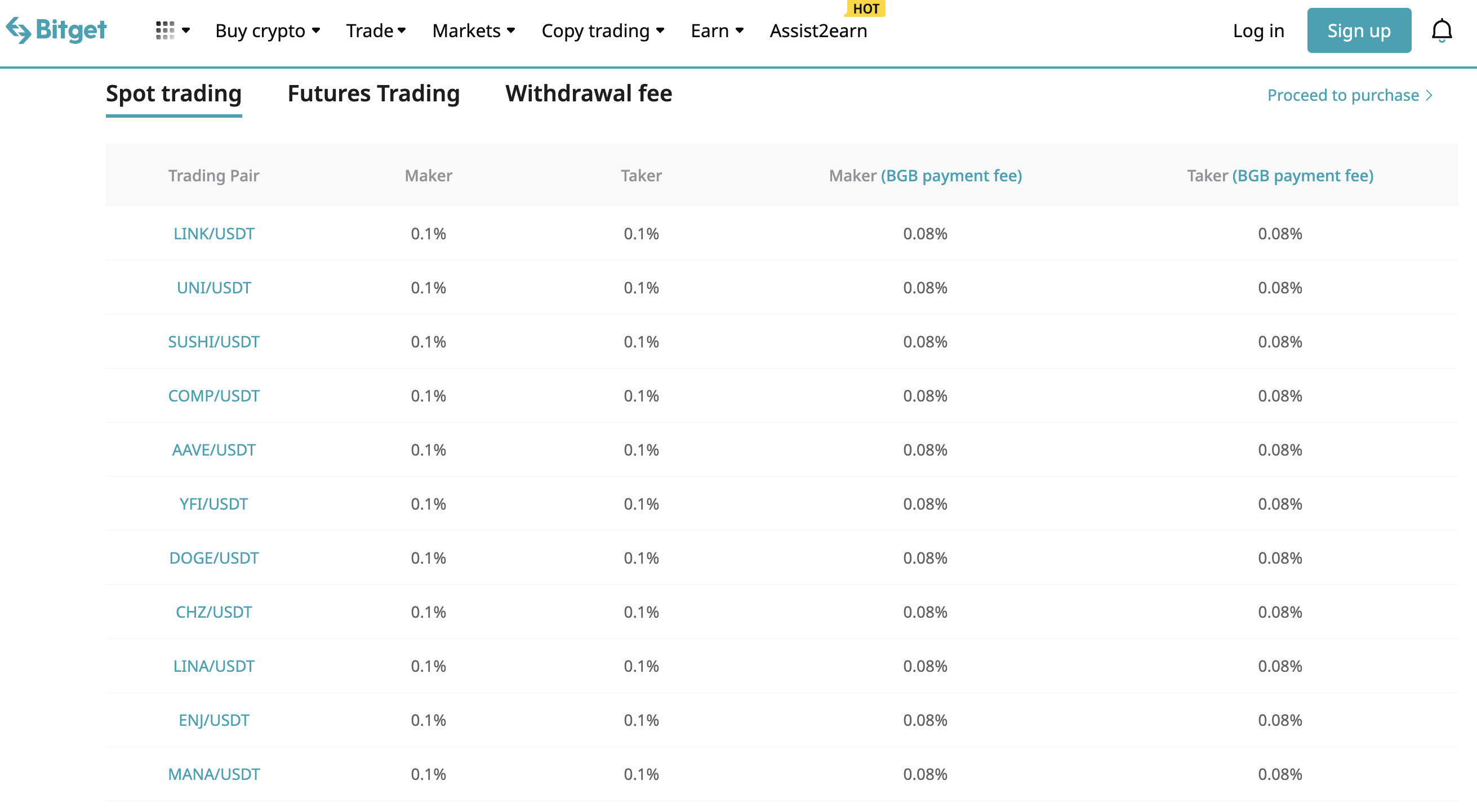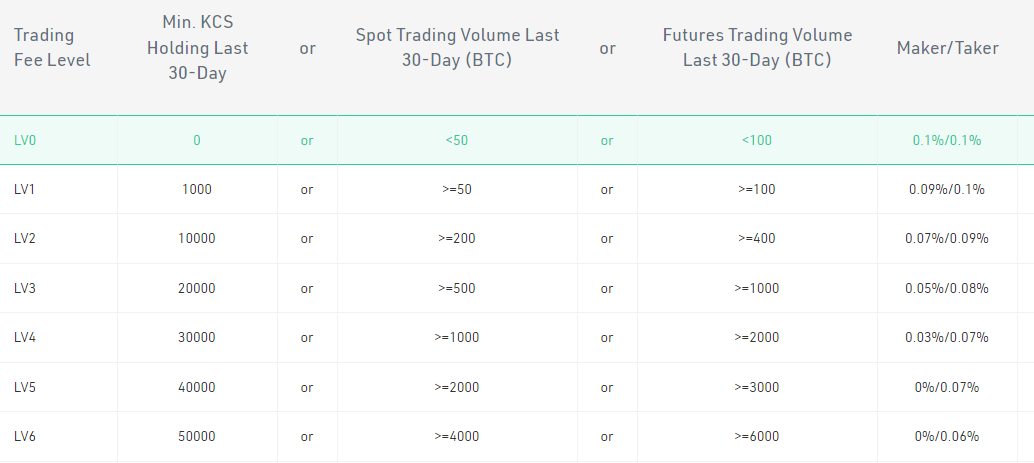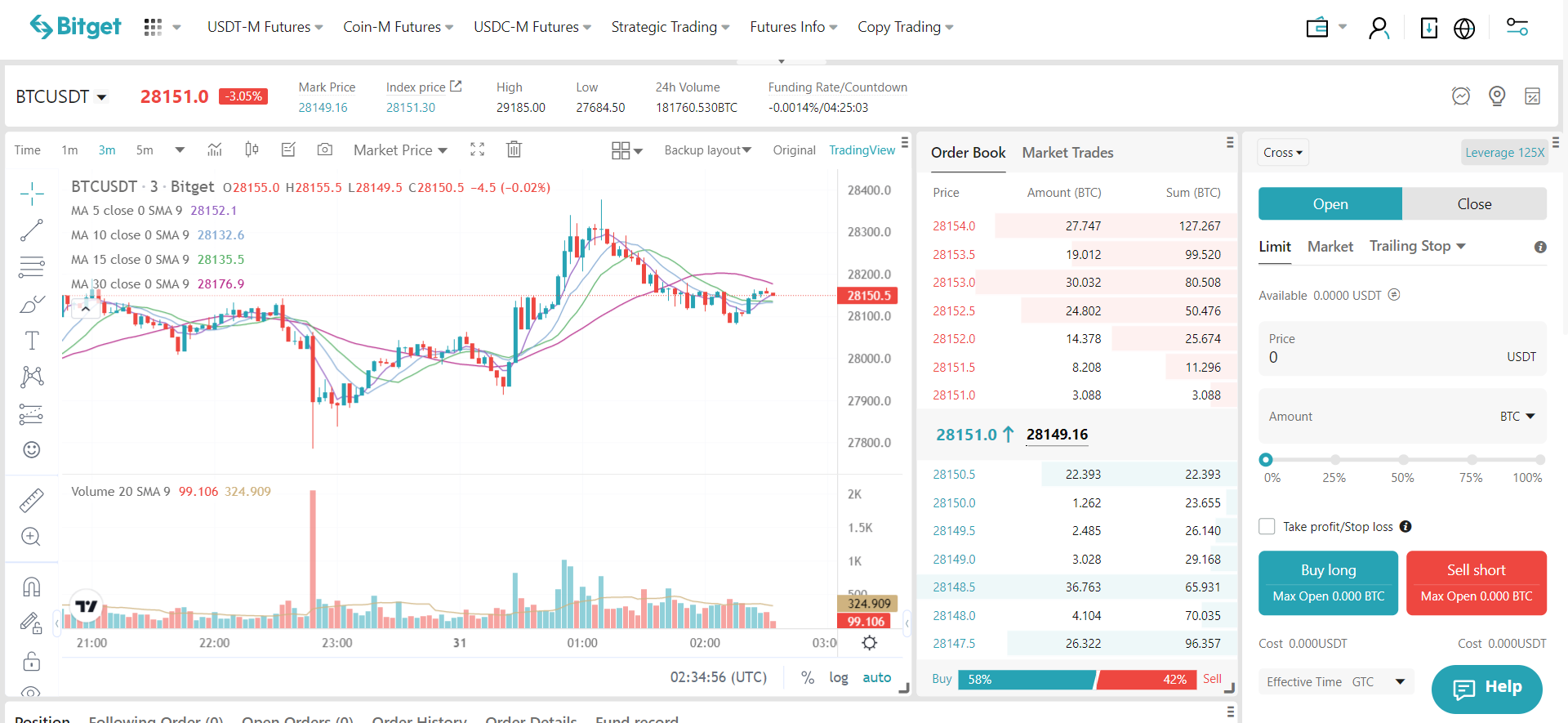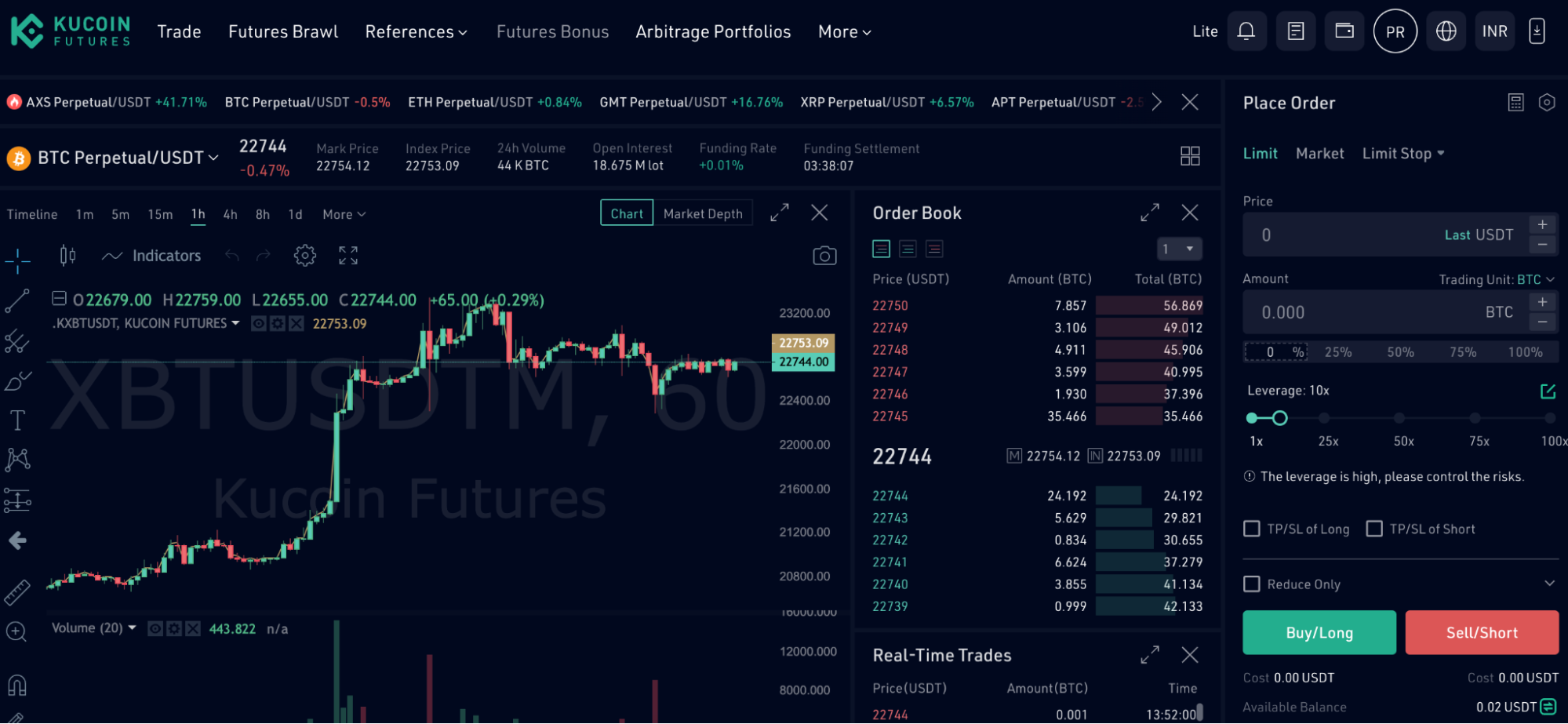You should know more about comparing Bitget vs. KuCoin, two titans in cryptocurrency trading.
Both Bitget and KuCoin have unique features, strengths, and weaknesses, but how do they stack up against each other?
Whether you’re a seasoned trader or a newcomer seeking a user-friendly platform, this article aims to provide you with all the information you need to make an informed decision.
Let’s dive in and dissect these platforms feature by feature.
Bitget vs KuCoin: At A Glance Comparison
| Feature | Bitget | KuCoin |
|---|---|---|
| Founded | 2018 | 2017 |
| Regulation | Regulated | Partially Regulated |
| Supported Coins | BTC, ETH, LTC, and more | Over 200 cryptocurrencies |
| Trading Types | Spot, Futures, Options | Spot, Futures, Margin, Staking |
| Leverage | Up to 125x | Up to 125x |
| Trading Fees | Tiered based on volume | Tiered based on volume |
| Deposit/Withdrawal Fees | Generally low | Low to none |
| KYC Requirements | Mandatory | Mandatory |
| Security Features | 2FA, Cold Storage, Insurance Fund | 2FA, Cold Storage, Security Audits |
| Customer Support | 24/7 via live chat, email, and social media | 24/7 via live chat and email |
| User Experience | Feature-rich but complex | User-friendly with advanced options |
| Mobile App | Available for Android and iOS | Available for Android and iOS |
Bitget vs KuCoin: Trading Markets, Products & Leverage Offered
Bitget: A Derivatives Powerhouse
First off, Bitget is a derivative trading platform, offering a range of products like Futures and Options.
You can trade with USDT and USDC as a base for your altcoin trading pair.
Bitget offers USDT-M trading as well.
But here’s the kicker: Bitget provides leverage of up to 125x on these derivative products.
This high leverage can be a double-edged sword, offering high rewards and risks.
The Bitget Launchpad allows users to gain early access to crypto projects launching on the platform before making them available to the public.
So, if you’re an experienced trader looking for a platform that offers a wide range of derivative products, Bitget might be your go-to.
KuCoin: A One-Stop Shop
On the other hand, KuCoin offers a broader range of trading markets.
You’ll find spot trading, Futures, margin trading, and staking options.
But wait, there’s more.
KuCoin also offers leverage up to 125x, matching Bitget in this regard. Up until recently, this number was at 100x.
KuCoin also has three different products for NFTs.
Wonderland is an NFT launch platform, and Windvane is an NFT marketplace where you can trade NFTs.
Fractional NFTs allow you to invest in blue chip NFTs by buying and selling a small portion to profit from the price movement.
On KuCoin, you have access to low-risk and high-risk products.
These vary from simple saving and staking, where you can extra APY by lending out your crypto, to more advanced products such as the Spotlight launch platform, KuCoin Pool, and KuCoin Win.
This makes KuCoin a versatile platform suitable for various day trading strategies and risk profiles.
Bitget vs KuCoin: Supported Cryptocurrencies
Bitget: Focused but Robust
First things first, Bitget offers a focused range of cryptocurrencies, primarily concentrating on popular coins:
- Bitcoin (BTC)
- Ethereum (ETH)
- Litecoin (LTC)
- BGB
- DAI
- USDC
- PEPECOMMUNITY
- AITECH
But here’s the exciting part.
Bitget also supports a variety of derivative products for these coins, allowing you to engage in more complex trading strategies.
KuCoin: A Smorgasbord of Options
On the flip side, KuCoin is like a smorgasbord regarding supported cryptocurrencies.
Offering over 200 different coins, KuCoin gives you the flexibility to diversify your portfolio extensively.
But wait, there’s more.
KuCoin not only supports popular coins but also offers a plethora of lesser-known altcoins, providing opportunities for high-risk, high-reward trading.
Some examples are:
- XRP
- DOGE
- DASH
- SEI
- LYX
- WLD
Trading Pairs: Mix and Match
Bitget offers a decent selection of trading pairs, mainly focusing on combinations involving BTC, ETH, and other major coins.
KuCoin, however, takes it up a notch by offering a multitude of trading pairs, including exotic combinations you won’t find on many other platforms.
Bitget vs. KuCoin: Trading Fee & Deposit/Withdrawal Fee Compared
Bitget: Tiered Fee Structure
First off, Bitget fees are charged as a tiered fee structure based on trading volume.
You will be able to enjoy low trading fees the more you trade.
But here’s the kicker.
Bitget also offers fee discounts for users who hold their native token (BGB), reducing your trading costs.
For spot trading, there is a flat 0.1% fee for both maker and taker, but with the use of BGB to pay the fee, you can get a discount.
The discount currently stands at 20%, which brings the fee to 0.08% for both market makers and market takers.
Regarding Futures trading, the fee is 0.02 percent, skewed in favor of the market maker, whereas the market taker pays a higher fee (0.06%).
Their VIP 5 level can be achieved by having a 30-day spot trading volume greater than 8,000,000 USDT, assets worth 3,000,000, or BGB holdings worth 6,000,000.
This level gives you a trading fee of 0.0125% for market makers and 0.035% for market takers.
You also get an extended 24-hour withdrawal limit of 8,500,000 USDT.
KuCoin: Competitive and Flexible
On the other hand, KuCoin also offers a tiered fee structure, but with a twist.
KuCoin’s fees start at a competitive rate, and you can further reduce them by holding their native KCS token.
But wait, there’s more.
KuCoin also offers fee discounts for high-volume traders, making it a cost-effective option for casual and professional traders.
If you reach their highest VIP level (Level 12), you can enjoy a rebate of 0.005% as a market maker and 0.025% as a market taker for Class A coins without any KCS.
With KCS as payment for trading fees, the market maker fee remains the same (a rebate of 0.005%), and the market taker fee is reduced to 0.02%.
This level comes with a withdrawal limit of 60,000,000 USDT.
Deposit and Withdrawal Fees: What’s the Damage?
Regarding deposit fees, both KuCoin and Bitget generally offer free deposits.
However, withdrawal fees can vary.
Bitget’s withdrawal fees are generally low and competitive, especially for popular cryptocurrencies like BTC and ETH.
For example, the BTC withdrawal fee is 0.0005 BTC on the BTC network, and the minimum withdrawal is 0.002 BTC.
KuCoin also offers low to non-existent withdrawal fees, depending on the cryptocurrency you’re dealing with.
To withdraw BTC on KuCoin on the BTC network, the fees and minimum withdrawal numbers are currently the same as on Bitget (Fee of 0.0005 BTC and a minimum withdrawal of 0.002 BTC).
Hidden Costs: Keep an Eye Out
Both platforms are transparent about their fee structures, but it’s always a good idea to be aware of any potential hidden costs.
These could include inactivity fees or for using certain types of orders.
Thankfully, neither Bitget nor KuCoin tries to hide such fees, making it easier to calculate your trading costs.
Bitget vs KuCoin: Order Types
Bitget: A Focus on Derivatives
First, Bitget provides a solid range of order types particularly useful for crypto trading.
You’ll find
- Market orders
- Limit orders
- Stop orders
But here’s where it gets interesting: Bitget also offers advanced order types for an edge in Spot and Futures trading, like
- Trailing Stop orders
- Iceberg orders
which are particularly useful for traders looking to maximize profits and minimize risks in volatile markets.
KuCoin: A Comprehensive Suite
On the other hand, a comprehensive suite of order types is supported on KuCoin that caters to a wide range of trading strategies.
You’ll find the usual.
- Market orders
- Limit orders
- Stop orders
But wait, there’s more.
KuCoin also offers advanced order types, like
- Stop-limit orders
- Post-only orders
- Scaled orders
This gives you the flexibility to buy and sell with complex trading strategies on your favorite cryptocurrency exchange.
Automation: Set It and Forget It
If you’re into automated trading, each crypto exchange has you covered.
Bitget allows you to set conditional orders that automatically trigger based on specific market conditions.
This is in addition to the crypto copy trading service, allowing users to load up their wallets and follow their favorite crypto traders.
Whatever trade your favorite trader takes is reflected in your account with no interference from your end.
KuCoin offers a similar feature and the ability to set up trading bots for more advanced automated strategies.
Bitget vs KuCoin: KYC Requirements & KYC Limits
Bitget
First, Bitget requires KYC verification for users who want to access advanced trading features and higher withdrawal limits.
But here’s the kicker: the process is straightforward and quick, usually taking less than a day for approval.
Once verified, users can take advantage of all the platform’s features and higher withdrawal limits.
KuCoin
On the other hand, KuCoin has recently made KYC mandatory.
You can start trading on KuCoin only after completing KYC verification.
Without KYC, you’ll be unable to make any trades on one of the largest crypto exchanges in the world and won’t be able to access certain features like fiat withdrawals.
Privacy vs. Limits: The Trade-Off
Both platforms offer a trade-off between privacy and functionality.
On Bitget, KYC is mandatory for accessing advanced features, but it also means you can take full advantage of the platform.
KuCoin offers more freedom for those who prefer not to complete KYC, but this comes at the cost of lower limits and restricted features.
Speed and Ease: Getting Through the Process
Both platforms have streamlined their KYC processes to make them as painless as possible.
Bitget usually completes verifications within a day, while KuCoin offers a quick and straightforward verification process.
Bitget vs KuCoin: Deposits & Withdrawal Options
Bitget: Straightforward but Limited
First up, Bitget offers straightforward deposit methods, and crypto deposits are also free, particularly for its supported cryptocurrencies like BTC, ETH, and LTC.
But here’s the catch.
Bitget primarily focuses on crypto-to-crypto transactions but also allows users to buy fiat currencies using third-party providers such as Simplex, Banxa, or your debit/credit card.
KuCoin: A Range of Options
On the flip side, KuCoin provides a broader range of deposit options.
Not only can you deposit various cryptocurrencies, but you can also deposit fiat via bank transfer (ACH) and even third-party payment processors.
But wait, there’s more.
KuCoin also supports stablecoins, giving you more options to hedge your investments.
Withdrawal Fees: What’s the Damage?
Both platforms generally offer low crypto withdrawal fees, but the rates vary depending on the cryptocurrency.
Bitget’s fees are competitive, especially for popular cryptocurrencies.
KuCoin also offers low to non-existent withdrawal fees, depending on the cryptocurrency you’re dealing with.
Speed: Getting Your Money Out
Both platforms aim to process your transactions as quickly as possible regarding withdrawal speed.
Bitget usually processes withdrawals within a few hours, while KuCoin also boasts quick withdrawal times, often completing transactions within the same timeframe.
Limits: How Much Can You Move?
Both platforms impose withdrawal limits, which can be increased by completing KYC verification.
Bitget offers higher limits for verified users, making it easier to move large sums.
KuCoin also offers tiered withdrawal limits, with higher tiers unlocked through KYC verification.
Bitget vs KuCoin: Trading & Platform Experience Comparison
Bitget: Feature-Rich but Complex
First, Bitget offers a feature-rich trading platform that caters to experienced traders.
You’ll find various advanced charting tools, indicators, and order types.
While the platform has features, it can be overwhelming for beginners.
If you’re one of the traders who want a robust set of tools, Bitget might be right up your alley.
KuCoin: User-Friendly with Depth
On the other hand, KuCoin offers a more balanced experience with spot trading and futures trading.
The platform is user-friendly enough for beginners but doesn’t skimp on advanced features for more experienced traders.
But wait, there’s more.
KuCoin also offers a mobile app, allowing you to trade on the go, and a range of educational resources to help you get up to speed. To learn more about the exchange, you can have a look at the KuCoin tutorial.
Customization: Make It Your Own
Both platforms offer a degree of customization to suit your trading style.
Bitget allows you to set up multiple trading screens and customize your indicators, while KuCoin offers a customizable dashboard where you can track your portfolio, markets, and even news.
Performance: Speed Matters
In trading, speed is of the essence.
Bitget and KuCoin offer high-performance trading engines designed to execute orders with minimal latency.
This ensures you can take advantage of market movements without worrying about delays.
Community and Social Trading: Learn from Others
Both platforms have active online communities where top crypto traders share insights, tips, and strategies.
These should not be considered investment advice, and you should do your research before you buy crypto.
KuCoin takes it a step further by offering a social trading feature, allowing you to follow and copy the trades of successful traders.
Bitget vs KuCoin: Customer Support
Bitget: 24/7 Support Across Channels
First, Bitget offers 24/7 customer support through multiple channels, including live chat, email, and social media.
But here’s the best part.
The support team is generally responsive and knowledgeable, helping to resolve issues quickly.
This is particularly useful if you’re trading in different time zones or need immediate assistance.
KuCoin: Comprehensive but Busy
On the other hand, KuCoin users have access to 24/7 support through live chat and email.
But wait, there’s more.
KuCoin has a comprehensive FAQ section and a range of educational resources to help you solve issues independently.
However, some users have reported longer wait times, particularly during high-traffic periods.
Language Support: Breaking Down Barriers
Both platforms offer support in multiple languages, breaking down barriers for international traders.
Bitget supports languages like English, Chinese, and Russian, while KuCoin expands the list further, including Spanish and French.
Community Support: Learning from Peers
In the KuCoin vs. Bitget debate, there are active online communities where you can seek advice and share experiences to make the better choice.
These communities can be a valuable resource for troubleshooting minor issues or learning new trading strategies to make secure crypto trading decisions.
Response Time: Every Minute Counts
In a fast-paced trading environment, every minute counts.
While both platforms aim to provide quick responses, Bitget generally has shorter wait times.
KuCoin, although offering comprehensive support, can sometimes take longer to respond, especially during peak trading hours.
Bitget vs. KuCoin: Security Features
Bitget: A Fortified Approach
First, in this Bitget review, the exchange employs a multi-layered security architecture to protect your assets.
You’ll find features like Two-Factor Authentication (2FA), cold storage for most funds, and an insurance fund to cover potential losses from system flaws or breaches.
But here’s the kicker: Bitget also undergoes regular security audits and proof of reserves to ensure its systems are up-to-date and resistant to new attacks.
KuCoin: Security with Transparency
On the other hand, KuCoin also takes a robust approach to security but adds a layer of transparency.
With 2FA and cold storage, KuCoin undergoes regular third-party security audits and publicizes results like Binance and Coinbase.
KuCoin charges a dedicated internal security team to continuously monitor suspicious activities, ensuring that issues are caught and dealt with promptly.
Insurance: A Safety Net
Both platforms offer some form of insurance to protect traders’ assets.
Bitget has an insurance fund to cover losses from system glitches or unexpected market events.
KuCoin also has protective measures, including an insurance fund and additional security protocols to safeguard against asset loss.
User Responsibility: Your Role in Security
Both platforms offer features like withdrawal whitelists and anti-phishing codes to help you take control of your security.
These features are designed to add an extra layer of protection, ensuring you’re not an easy target for hackers.
Incident Response: When Things Go Wrong
In the unfortunate event of a security incident, Bitget and KuCoin have incident response plans to manage and mitigate the impact.
These plans include immediate communication with users and steps to secure assets and data.
Is Bitget Safe & Legal To Use?
When it comes to trading cryptocurrencies, safety and legality are often at the forefront of traders’ minds.
So, is an exchange like Bitget safe and legal to use?
Let’s get straight to the point.
- Regulatory Compliance: Playing by the Rules
First, Bitget is a regulated exchange compliant with the laws of the jurisdictions in which it operates.
The platform also adheres to international financial standards, adding an extra layer of legitimacy.
- Security Measures: A Fortified Fortress
As discussed, Bitget Security employs a multi-layered architecture, including 2FA, cold storage, and regular security audits.
Bitget also has an insurance fund to cover potential losses from system flaws or breaches, giving you an added layer of protection.
- User Reviews: The Voice of the People
User reviews for Bitget are generally positive, especially regarding security and compliance.
This indicates that the platform takes its users’ safety seriously and is committed to providing a secure trading environment.
- Transparency: Keeping Things Open
Bitget is transparent about its operations, regularly updating users on any changes to the platform, security measures, or regulatory compliance.
This level of transparency is a good sign that the platform is safe and legal to use.
In summary, Bitget appears safe and legal for cryptocurrency trading.
It is a regulated exchange with robust security measures and a transparent operation approach.
While no platform can guarantee 100% security, Bitget takes multiple steps to ensure your assets and data are as safe as possible.
Is KuCoin Safe & Legal To Use?
Safety and legality are paramount concerns in the fast-paced world of cryptocurrency trading.
So, what’s the verdict after this KuCoin review?
Is it safe and legal to use?
Let’s dive right in.
- Regulatory Status: A Grey Area
First, KuCoin operates in a bit of a regulatory grey area.
While any major financial authority does not explicitly regulate it, it does comply with the laws of the jurisdictions where it operates.
But here’s the kicker.
KuCoin is actively working to improve its regulatory compliance and has been transparent about its efforts.
- Security Protocols: A Multi-Layered Approach
When it comes to security, KuCoin doesn’t cut corners.
The platform employs various security measures, including 2FA, cold storage, and regular third-party security audits.
But wait, there’s more.
KuCoin also has an internal security team that monitors suspicious activities 24/7, adding an extra layer of protection.
- User Feedback: A Mixed Bag
User reviews for KuCoin are generally positive, particularly regarding the platform’s security features.
However, some users have raised concerns about the platform’s regulatory status, which is something to consider if you’re particularly cautious about legal compliance.
- Transparency: An Open Book
KuCoin is transparent about its security measures and regularly updates its users on any platform changes or features.
This level of transparency is a strong indicator that KuCoin is committed to user safety and legal compliance.
In summary, while KuCoin may not be regulated by any major financial authority, it takes significant steps to ensure it is a safe and compliant platform to the best of its ability.
It employs robust security measures and is transparent about its operations, making it a generally safe option for cryptocurrency trading.
However, if you’re concerned about regulatory oversight, you may want to dig deeper into its legal status in your jurisdiction.
Bitget vs KuCoin Conclusion
So, you’ve made it to the end of this comprehensive comparison.
Now, the million-dollar question: Should you go with Bitget or KuCoin?
Let’s wrap it up.
- For the Experienced Trader: Bitget
If you’re an experienced trader looking for a platform that offers advanced trading tools, various order types, and a focus on derivatives, Bitget is the better exchange.
But here’s the kicker.
Bitget also offers robust security features and quick customer support, making it a well-rounded choice for those who know their way around the crypto market.
- For the Versatile Trader: KuCoin
If you’re looking for a platform that offers a balanced user experience, a wide range of cryptocurrencies, and multiple deposit options, including fiat, KuCoin is the way to go.
But wait, there’s more.
KuCoin is also a good fit for those who value transparency and a community-oriented platform.
- The Final Word
After examining the pros and cons of both the crypto futures trading platforms, Bitget and KuCoin offer compelling features, robust security measures, and responsive customer support.
Your choice will ultimately depend on your trading needs, experience level, and specific security and legal considerations.
Either way, both platforms offer a solid trading experience that caters to a range of trader profiles.
Learn how does Bitget & KuCoin stack up against the competition:
- Bitget vs Bybit
- Bitget vs Phemex
- Bitget vs OKX
- KuCoin vs Binance
- KuCoin vs Kraken
- KuCoin vs StromGain

